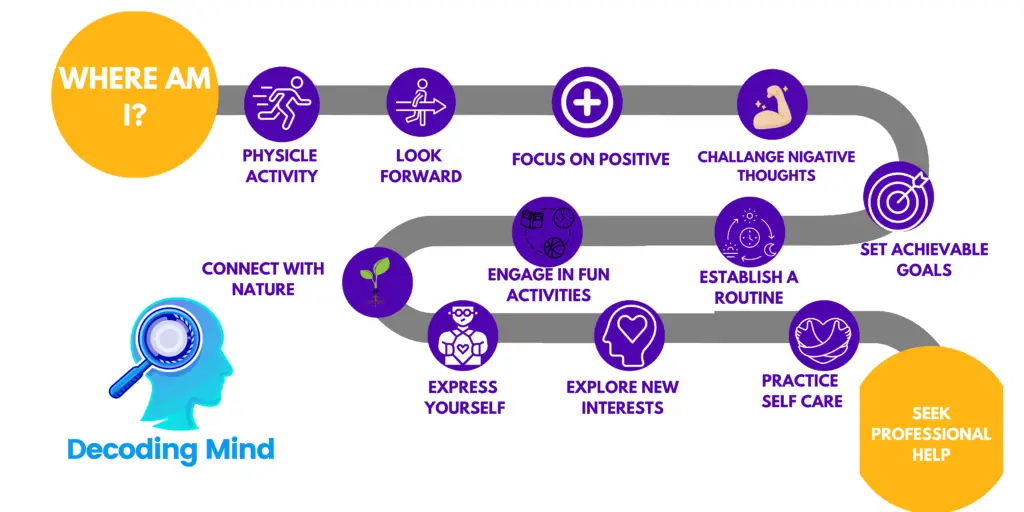
Depression can feel like a heavy blanket, making even simple tasks seem daunting. However,
there are strategies you can adopt to help lift this weight, even if just a little.
While these steps are not a cure for depression, they can help you regain a sense of control and
improve your overall well-being.

Acknowledge Where You Are
Understand that depression is a common experience shared by many. Accepting your current
state without judgment can be the first step towards healing.
Remember, your current feelings are not a permanent fixture.
Start Small with Physical Activity
Physical movement, as simple as a walk around the block, can significantly impact your mood.
Exercise releases endorphins, which have a natural mood-lifting effect. Start with small,
manageable goals to avoid feeling overwhelmed.
Look Forward, Not Back
Each day is a new opportunity. If today was particularly challenging, remind yourself that
tomorrow brings a unique chance to try again. Keeping a journal can help you track your moods
and recognize patterns, reminding you that emotions are transient.
Focus on the Positive
Depression often magnifies negative thoughts, making it hard to see the good. Actively
acknowledging the positive aspects of your day, no matter how small, can shift your perspective.
Consider keeping a gratitude journal to highlight these moments.
Challenge Negative Thoughts
Depression can amplify a critical inner voice that discourages you from engaging in activities
that might make you feel better. Challenge these thoughts by doing the opposite of what they
suggest, even if it’s just for a short while.
Set Achievable Goals
Break tasks into smaller, more manageable steps. This can prevent feeling overwhelmed and help
you build a sense of accomplishment. Celebrate these small victories; they are significant steps
to feeling better.
Establish a Routine
Creating a simple, flexible routine can provide structure and a sense of normalcy. This doesn’t
mean scheduling every minute of your day but establishing a gentle framework to guide you
through.
Engage in Enjoyable Activities
Depression can sap your interest in activities you once enjoyed. Push back against this by setting
aside time for hobbies and interests. These activities can serve as a much-needed distraction and
source of joy.
Connect with Nature and Others
Spending time in nature and with loved ones can profoundly affect your mood. Even if you don’t
feel like it, try to push yourself to interact with others and the world around you. These
connections can be incredibly healing.
Express Yourself
Writing or journaling about your feelings can provide an outlet for your emotions and help you
process them more effectively. It can also serve as a reminder of your progress over time.
Explore New Interests
Trying new activities can stimulate your brain and offer a fresh perspective. Whether it’s a new
hobby, learning a skill, or volunteering, these experiences can provide a sense of purpose and
fulfilment.
Practice Self-Care
Prioritize activities that promote well-being, such as meditation, yoga, or simply taking a
relaxing bath. Eating a balanced diet, limiting alcohol and caffeine, and ensuring you get enough
sleep is also crucial for managing depression.
Seek Professional Help
If your depression feels overwhelming or persistent, don’t hesitate to seek professional help.
Therapy and, in some cases, medication can be highly effective in managing depression.
Remember, taking the first step is often the hardest part, but each small step forward is progress.
Be kind to yourself and acknowledge the effort it takes to fight against depression.
